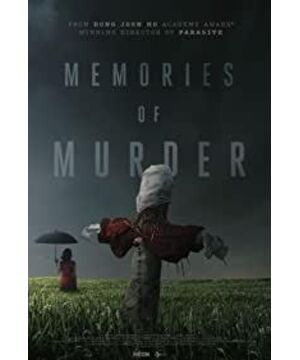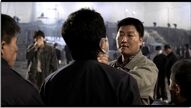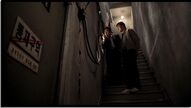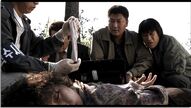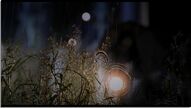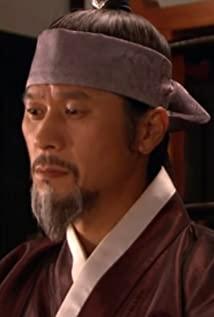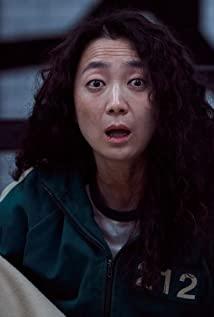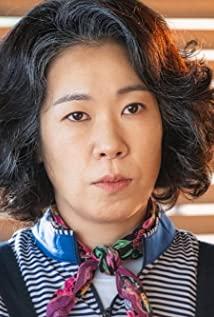We don’t know what the truth and evidence of this unsolved series of murders in South Korea are, and whether there is a similar suspect like Park Hung-kui, we don’t know now (hopefully which bean friend has the knowledge and ways to learn about this), we can discuss it. Just rely on the clues given by the film.
For this reason, after excluding the fool Bai Guanghao and the masturbator Qiao Bingchun, the retired youth Park Xingkui was the most suspected and most inscribed in the film. But even this clue allowed the director to rule out the suspicion in the last case. Sperm DNA identification, but Park Xingkui's clothes. Please note that when Officer Xu was monitoring Park Xingkui in the car, Park was wearing a gray overalls and black pants when he boarded the bus, and the murderers who dealt with the victimized girl in the rain were black shirts and gray pants. There are two questions here: No. 1. Is it still the same as the original one, but the color difference is only caused by the rainy night light problem in the film? the answer is negative. Because when Police Officer Xu unearthed Park from his home the next day, Park was still in the black jacket and gray pants he had when he got on the bus. It was impossible for him to go home after committing crimes on a rainy night and still sleep in wet clothes. Second, is it possible for Park to go home and put on new clothes, put on a raincoat, and then come out to commit the crime after leaving the surveillance, and then go home and change the original suit after committing the crime? This is also not logical. Because the murderer didn't know that there was an audience watching, there was absolutely no need to do it again. Besides, how could Park know that Xu could not send the car at a critical moment and could not continue to follow him.
Many netizens criticized South Korea’s superstition of American DNA identification technology at the time, but I understand that this treatment of the film is exactly the director’s reflection and denial of this respect, and it is the director’s reluctance or fear of accepting this result in its entirety, so The detail of the clothes change is specially designed to show that Park is not committing the crime at all. In other words, in the eyes of the director and the Koreans he represents, the DNA identification at the time was only a reference, not the key to solving the case.
From the point of view of criminal investigation, such a treatment is also reasonable. First of all, it is indeed questionable whether the authority of DNA technology identification at that time in 1986 was sufficient. When I listened to Li Changyu’s lecture recently, Li mentioned that the US police had discovered more than one DNA identification error, and now they are investigating many convictions that have been identified as the murderer by DNA. Secondly, from the perspective of excluding reasonable suspicion from the science of evidence, the police found a drop of semen on the clothes of a deceased, and it should also investigate whether the deceased had sex with any man before his death. If this possibility cannot be ruled out, it should be The semen cannot be determined to be the suspect’s possession, so the forensic doctor’s statement that “that would be quite favorable evidence” is still cautious. It can only be said of this. Officer Xu’s despair and despair when looking at the official document in the rain Raising a gun in despair is more a psychological manifestation of losing the last straw, rather than a consistent rational behavior.
As for the various opinions on the Internet, the middle-aged man who repaired the boiler in the torture room, the woman crying on the hill behind the school, and the students eating hot pot in the Guanghao shop are all unfounded speculations. Of course, why the woman could escape the clutches of the murderer and not die, I didn't understand, which bean friend would tell me.
Besides, are Bai Guanghao's words a clue? Guanghao should be an eyewitness. Regardless of whether the person with limited capacity has the ability to testify or not, it is at least a very important breakthrough in this case. Guanghao didn't look squarely at Park Hung Kwan's face, but turned his head and muttered the scene when he was thrown into the fire when he was young. This kind of treatment in the film feels a bit meaningful. It should be someone who was connected with the incident that burned Xiao Guanghao. Regarding the question that Guanghao avoided discussing, whether it is a selective forgetting, the movie does not give enough clues, I can't judge.
I once thought: If Park Xingkui is not the murderer, why can't he answer what was the last song on the police officer radio station? Why did you not go home within two hours of being out of surveillance? I imagined two possibilities: 1. I dislike the police, so I don’t want to cooperate. But this should be analyzed in light of his experience, scope of communication, and living habits. Apart from a few words, the film does not seem to give any more clues. I remember that he said during the trial that "the child knows that you tortured the suspect" When the fat police officer pinched his eyes in the rain, he scolded him as a "bastard", and he could slightly see his psychological tendency. 2. Is there any suspicion of inducement or deception in the police interrogation? For example, there is obviously no such plot, and the illusion that the host has read the name is made up to cause the suspect's self-psychological defense to collapse. You must know that such a method is not uncommon in investigative practice. On the other hand, the previous police officer Xu may not use it. This way of interrogation, but at this moment he has exchanged ideas with the fat police officer, and he is going crazy.
Rewatching this movie five years later still makes me sigh. The movie did not intend to explore the effectiveness of evidence, etc., so the audience need not be obsessed with it. Watching it now, I can’t help but think of the current situation of criminal investigation in China over the past few decades. Although it is constantly improving, there are still some places or deep levels. So similar: Whenever leaders (including those from other countries) arrive, the police and the army will maintain order at five steps, one sentry, and ten steps. Whenever a major incident occurs, the police will take a high-handed attitude toward the media while facing the so-called The suspect was tortured to extract a confession. If it were not for the victim to return to the world, when would Zhao Zuohai's unjust case turn around? How many Zhao Zuohai is looking forward to turning over? I don't know, I don't dare to think about it. I think too much, thinking back to "Memories of Murder", thinking of Qiao Yonggu's iconic flying kick and amputation endgame, just like this society.
I sincerely hope that our democracy and legal system will progress faster and faster.
If Song Kanghao finally looked at the murderer with a trace of astonishment, a trace of dazedness, and a trace of anger, I would say that he represents not only himself, but in addition to the helpless police, but also the innocent in his eyes. The victims, because the place where he stood was where they were first killed.
View more about Memories of Murder reviews


